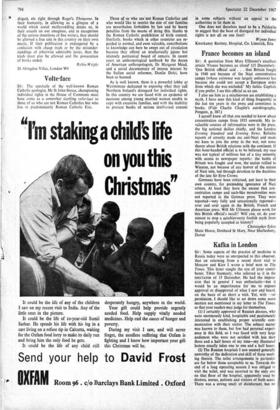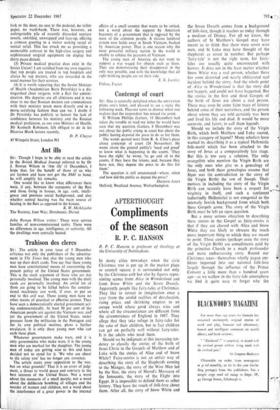Kafka in London
Sir: Some aspects of the practice of medicine in Russia today were so unexpected to this observer, that on returning from a recent short visit to Moscow and Kiev I wrote a brief note to The Times. This letter caught the eye of your contri- butor, Tibor Szamuely, who referred to it in the SPECTATOR of 15 December. He had the impres- sion that in general I was enthusiastic—but it would be an impertinence for me to express approval or disapproval of what I saw and heard, on the basis of so short a visit. Yet, with permission, I should like to set down some more matters not mentioned in my letter to The Times, so that your readers may judge for themselves.
(1) I certainly approved of Russian doctors, who were enormously kind, hospitable and passionately jnterested in establishing proper scientific com- munication with their visitor. The subject matter was known to them, but few had personal experi- ence in this field, so I was faced with very large audiences who were not satisfied with less than three and a half hours of my time—my illustrated lecture usually takes one to one and a half hours.
(2) The Russian hospitals I saw seemed generally unworthy of the dedication and skill of those work- ing therein. The toilet arrangements in particular are far below those acceptable to us. Towards the end of a long operating session I was obliged to visit the toilet, and was escorted to the only one on that floor of the hospital, apparently used by doctors, nurses, patients and visitors of both sexes. There was a strong smell of disinfectant, but no
lock to the door, no seat to the pedestal, no toilet- paper, no wash-basin. There was, however, an unforgettable pile of recently discarded sanitary towels, unfolded, unwrapped and face-up, offering a crimson greeting to a visitor seeking rectal or vesical relief. This loo struck me as providing a memorable contrast to the high-class surgery and sophisticated surgical equipment on display but thirty paces distant.
(3) Private medical practice does exist in the Soviet Union! I am satisfied from my own inquiries that top people are treated in top hospitals and clinics by top doctors, who are rewarded in the usual manner for their services.
(4) It is worth repeating that the Soviet Minister of Health (Academician Boris Petrofsky) is a dis- tinguished chest surgeon, with a flair for admini- stration. His deputies are all clinicians and it was clear to me that Russian doctors can communicate with their ministry much more directly and in a morn, satisfying fashion than can we. I doubt if Dr Petrofsky has publicly to lament the lack of confidence between his ministry and the Russian medical profession, as our own Minister of Health, Mr Kenneth Robinson, felt obliged to do in his Maurice Bloch lecture recently.



































 Previous page
Previous page